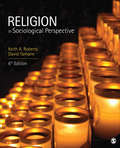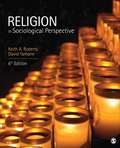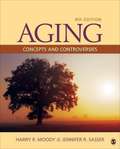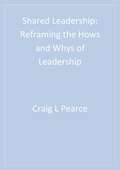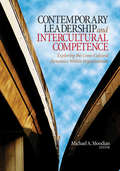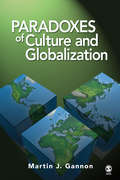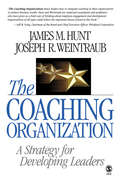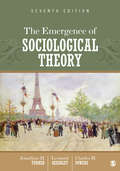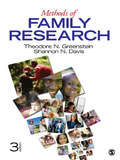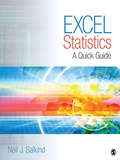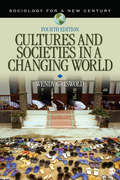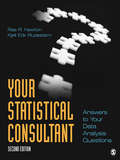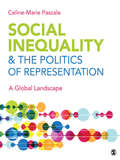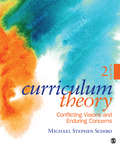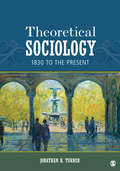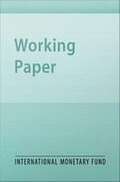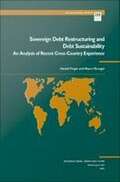- Table View
- List View
Religion in Sociological Perspective
by Keith A. Roberts David A. YamaneThis fully updated Sixth Edition of Religion in Sociological Perspective introduces students to the basic theories and methods in the field, and shows them how to apply these analytic tools to new groups they encounter. Authors Keith A Roberts and David Yamane explore three interdependent subsystems of religion—meaning, structure, and belonging—and their connections to the larger social structure. While they cover the major theoretical paradigms of the field and employ various middle-range theories to explore specific processes, they use the open systems model as a single unifying framework to integrate the theories and enhance student understanding.
Religion in Sociological Perspective
by David Yamane Keith A. RobertsAuthors Keith A Roberts and David Yamane explore three interdependent subsystems of religion—meaning, structure, and belonging—and their connections to the larger social structure. While they cover the major theoretical paradigms of the field and employ various middle-range theories to explore specific processes, they use the open systems model as a single unifying framework to integrate the theories and enhance student understanding.
Aging: Concepts And Controversies
by Harry R. Moody Jennifer R. SasserPresenting current research in an innovative format, Harry Moody and Jennifer Sasser's Aging: Concepts and Controversies encourages students to become involved and take an informed stand on the major aging issues that we face as a society. Using their extensive expertise, the authors provide a thorough explanation of the issues in the Concepts sections and current research in the Controversy sections, demonstrating the close links between concepts and controversies in these broad areas of aging: health care, socioeconomic trends, and the life course.
Shared Leadership: Reframing the Hows and Whys of Leadership
by Jay A. Conger Dr Craig L. PearceShared Leadership: Reframing the Hows and Whys of Leadership brings together the foremost thinkers on the subject and is the first book of its kind to address the conceptual, methodological, and practical issues for shared leadership. Its aim is to advance understanding along many dimensions of the shared leadership phenomenon: its dynamics, moderators, appropriate settings, facilitating factors, contingencies, measurement, practice implications, and directions for the future. The volume provides a realistic and practical discussion of the benefits, as well as the risks and problems, associated with shared leadership. It will serve as an indispensable guide for researchers and practicing managers in identifying where and when shared leadership may be appropriate for organizations and teams.
Contemporary Leadership and Intercultural Competence: Exploring the Cross-Cultural Dynamics Within Organizations
by Michael A. MoodianIn the 21st century, effective leadership can be defined partially as having an ability to adapt and persevere in various cross-cultural environments. Concurrently, in an increasingly globalized environment, leadership requires a keen capacity for understanding and utilizing cultural diversity to build successful organizations. Contemporary Leadership and Intercultural Competence is a breakthrough text that features contributing chapters from some of the world′s leading scholars in the field of cross-cultural leadership. The book comprises 20 chapters that examine the evolving role of cultural diversity in the workplace, the application of cultural comprehension to organizations, and the measurement of various aspects of intercultural competence. Key Features A unique blend of theory and practical applications Several breakthrough, first-of-their-kind chapters on topics such as leadership assessments that measure parameters of intercultural competence, the legal implications of cross-cultural leadership and trade, and the development and implementation of a multicultural vision A plethora of modern examples that provide an accurate description of the contemporary landscape within organizations Invigorating discussion questions at the conclusion of every chapter that engage students Intended Audience Contemporary Leadership and Intercultural Competence is an excellent text for graduate-level courses in Organizational Development, Organizational Behavior, Leadership Theory, Cross-Cultural Management, International Business, Human Resource Management, Educational Leadership, and Public Administration. The book will be of great interest to students, senior managers, cross-cultural management consultants, government leaders, and human resource practitioners.
Paradoxes of Culture and Globalization
by Martin J. Gannon"A truly extraordinary book! The range of knowledge revealed by the author is quite astonishing and the material presented is done so in a clear and unambiguous writing style."The book includes astonishingly varied perspectives on issues that will impact the hoped-for positive consequences of globalization. I felt I was being informed by an expert who grasps the complexity of the issues involved in ways that make them clear and useful. If I was teaching a course that had anything to do with globalization and/or culture, I would assign this book—and if I knew of someone who was being assigned to another country, I would require him or her to read this book."—Benjamin Schneider, Valtera Corporation and Professor Emeritus, University of MarylandWhat is a paradox? Why are cross-cultural paradoxes essential for understanding the changes that are occurring because of globalization? Encompassing a wide variety of areas including leadership, cross-cultural negotiations, immigration, religion, economic development, and business strategy, Paradoxes of Culture and Globalization develops cross-cultural paradoxes essential for understanding globalization. Key FeaturesHighlights over 90 paradoxes structured in a question/discussion format to actively engage readers and provide an integrative overview of the bookPresents key issues at a higher and integrative level of analysis to avoid stereotyping particular culturesFacilitates class discussions and the active involvement of class members in the learning process of culture and globalization.Enlarges individuals' conceptual understanding of cross-cultural issues Focuses on both traditional and controversial topics including motivation and leadership across cultures, communicating and negotiating across cultures, immigration, religion, geography, economic development, business strategy, and international human resource managementIntended AudienceThis is an excellent text for advanced undergraduate and graduate courses in International Management, International Business, Comparative Management, World Business Environment, Cross-Cultural Management, Cross-Cultural Communications, and Cultural Anthropology in the departments of business and management, communication, and anthropology.Meet author Martin J. Gannon! www.csusm.edu/mgannonMartin J. Gannon is also the author of the bestselling text Understanding Global Cultures (SAGE, Third Edition, 2004) and Cultural Metaphors: Readings, Research Translations, and Commentary (SAGE, 2000).
The Coaching Organization: A Strategy for Developing Leaders
by James M. Hunt Joseph R. WeintraubThe Coaching Organization: A Strategy for Developing Leaders is the only book to provide practical advice on how a company can strategically manage coaching initiatives that strengthen organizations and enhance employee engagement and growth. Authors James M. Hunt and Joseph R. Weintraub offer best practices to help organizations deploy developmental coaching that drives leadership and employee effectiveness. Key Features: Offers a strategic view of how to manage developmental coaching: Coaching initiatives are often deployed on an ad hoc and unmanaged basis and as such often yield disappointing results. This book provides a guide for the strategic management of coaching initiatives including executive coaching, internal coaching, coaching by managers, and peer coaching, so as to maximize their impact and value. Presents credible and practical examples of successful coaching initiatives: Case-based research conducted by leading academics and practitioners illustrates how organizations can link coaching initiatives and organizational success. Case studies from organizations such as Whirlpool, Wachovia, Children′s Hospital Boston, and Citizens Financial Group offer clear guidance on the organizational use of coaching. Identifies assessment tools for developing and maintaining coaching initiatives: Organizational and coaching competency tools are provided to help design appropriate organizational coaching initiatives, select expert coaches, and train internal peer coaches and coaching managers. In addition, the book offers no-cost and low-cost ideas to help organizations spend less money while achieving better results. Intended Audience: This is an excellent text for advanced undergraduate and graduate courses in Human Resource Management, Human Resource Development, Industrial and Organizational Psychology, Organizational Effectiveness, Executive Coaching, and Leadership. It is also a valuable resource for executives, managers, and human resource professionals.
The Emergence of Sociological Theory
by Jonathan H. Turner Leonard Beeghley Dr Charles H. PowersNow published by SAGE, this scholarly text covers the first one hundred years of sociological theorizing, from 1830-1930, focusing primarily on Comte, Spencer, Marx, Weber, Simmel, Durkheim, and Mead. The text provides an in-depth examination of these early sociological theorists with biographical background, analysis of key works, major influences, critical insights, and also answers the question, "What do these ideas tell us about the basic forces that shape the social world?" Posing this question for each theorist adds a unique perspective to the text and distinguishes it from other sociological theory books. In addition, it also includes material on the enduring models and principles of the theorists' work that continue to inform sociological theory today.
Methods of Family Research
by Shannon N. Davis Theodore N. GreensteinProud sponsor of the 2019 SAGE Keith Roberts Teaching Innovations Award—enabling graduate students and early career faculty to attend the annual ASA pre-conference teaching and learning workshop. In the 3rd edition of Methods of Family Research, authors Theodore N. Greenstein and Shannon N. Davis continue to help students better understand the research results they encounter in doing family research. Using real-life examples to illustrate important concepts that family researchers encounter regularly, the text covers traditional quantitative methods, qualitative methods, and the mixed-method approach. Written in a clear, concise style, this book differs from other research methods texts, which focus on teaching students how to produce research, by teaching them how to consume research in a sophisticated, effective manner. The book introduces the basic concepts of social science research methods without excessive technical details.
Excel Statistics: A Quick Guide
by Neil J. SalkindBecome a pro at using Excel for statistical analysis! Designed for users already familiar with basic computer operations, Neil J. Salkind's Excel Statistics: A Quick Guide shows readers how to utilize the features of Microsoft Excel to answer both simple and complex questions about data analysis. Excel novices and experts alike will find this text not only practical but easy to use and engaging.
Cultures and Societies in a Changing World
by Dr Wendy GriswoldIn the Fourth Edition of Cultures and Societies in a Changing World, author Wendy Griswold illuminates how culture shapes our social world and how society shapes culture. Through this book, students will gain an understanding of the sociology of culture and explore stories, beliefs, media, ideas, art, religious practices, fashions, and rituals from a sociological perspective. Cultural examples from multiple countries and time periods will broaden students' global understanding. Students will develop a deeper appreciation of culture and society from this text, gleaning insights that will help them overcome cultural misunderstandings, conflicts, and ignorance and that will help equip them to live their professional and personal lives as effective, wise citizens of the world.
Your Statistical Consultant: Answers to Your Data Analysis Questions
by Dr Kjell Erik Rudestam Dr Rae R. NewtonAlthough many graduate students and researchers have had course work in statistics, they sometimes find themselves stumped in proceeding with a particular data analysis question. In fact, statistics is often taught as a lesson in mathematics as opposed to a strategy for answering questions about world[?], leaving beginning researchers at a loss for how to proceed. In these situations, it is common to turn to a statistical expert, the "go to" person when questions regarding appropriate data analysis emerge. Your Statistical Consultant is an authentic alternative resource for describing, explaining, and making recommendations regarding thorny or confusing statistical issues. Written to be responsive to a wide range of inquiries and levels of expertise, this book is flexibly organized so readers can either read it sequentially or turn directly to the sections that correspond to their concerns and questions.
Social Inequality & The Politics of Representation: A Global Landscape
by Celine-Marie PascaleIn a global landscape, the representational practices through which inequalities gain meaning are central- both within and across national boundaries. Social Inequality & The Politics of Representation takes a fresh look at how inequalities of class, race, sexuality, gender, and nation are constructed in twenty countries on five continents. It offers both rich insight and cultural critique- yet it does not offer a universal paradigm, nor is it concerned with debates about scholarship from "the center" or "the periphery". The collection de-centers North American/European paradigms by placing scholarship from countries around the globe on equal footing. Readers will find a variety of analytical styles including frame analysis, semiotics, poststructural discourse analysis, critical discourse studies, and conversation analysis. Each chapter provides an overview of relevant cultural and historical contexts for an international audience as well as a brief introduction to relevant methodological and theoretical frameworks. Consequently, it is both a richly diverse and easily accessible collection.
Curriculum Theory: Conflicting Visions and Enduring Concerns
by Michael Stephen SchiroThe Second Edition of Curriculum Theory: Conflicting Visions and Enduring Concerns by Michael Stephen Schiro presents a clear, unbiased, and rigorous description of the major curriculum philosophies that have influenced educators and schooling over the last century. The author analyzes four educational visions—Scholar Academic, Social Efficiency, Learner Centered, and Social Reconstruction—to enable readers to reflect on their own educational beliefs and more productively interact with educators who might hold different beliefs.
Theoretical Sociology: 1830 to the Present
by Jonathan H. TurnerWritten by award-winning scholar Jonathan Turner, Theoretical Sociology: 1830 to the Present covers new and emerging aspects of sociological theory and examines the significant contributions of both modern and founding theorists. Nine sections present detailed analyses of key theories and paradigms, including functionalism, evolutionary theory, conflict theory, critical theory, exchange theory, interactionist theory, and structuralism. Despite the in-depth discussions of theorists and their contributions to the field, the text is concise and focused, a perfect resource for readers seeking to develop a deeper understanding of contemporary and classical sociological theory.
Lead from the Heart: Transformational Leadership for the 21st Century
by Mark C. CrowleyIf you're a leader in America, you've got a big problem. More than half of all workers hate their jobs. In fact, job satisfaction and employee engagement have been declining for twenty-two straight years. One hundred years ago, a job and a paycheck kept workers satisfied. Now, pay barely makes the list. Employees' needs have evolved dramatically. But our leadership practices have failed to keep up. In Lead From The Heart, Mark C. Crowley presents compelling new evidence that the solution leaders need lies in the last place traditional business would seek it: the human heart. Twenty-first-century employees need to feel... valued, respected, developed, and cared for. Their work has to matter. Recent scientific discoveries tell us that it's the heart, and not the mind, that drives human performance and achievement. Drawing on decades of experience as a senior leader for regional and national financial institutions, Mark C. Crowley offers proof that leaders who intentionally engage the hearts of their employees will be rewarded with uncommon (and highly sustainable) performance and achievement.
Statistical Inference as a Bargaining Game
by Eduardo LeyA report from the International Monetary Fund.
Social Security Reforms in Colombia: Striking Demographic and Fiscal Balances
by Sergio ClavijoA report from the International Monetary Fund.
Tax Reforms, "Free Lunches", and "Cheap Lunches" in Open Economies
by Giovanni Ganelli Juha TervalaA report from the International Monetary Fund.
What Drives Household Borrowing and Credit Constraints? Evidence from Bosnia and Herzegovina
by Mali Chivakul Ke Chen ChenA report from the International Monetary Fund.
Sovereign Debt Restructuring and Debt Sustainability
by Harald FingerRestoring a country's debt to a sustainable path after a sovereign debt restructuring is key to ensuring a credible and durable exit from the crisis. In recent years, a number of countries have restructured their sovereign liabilities, either following a default, or preemptively, to avoid a default. This Occasional Paper takes stock of the experiences of some of these countries--Argentina, the Dominican Republic, Ecuador, Moldova, Pakistan, Russia, Ukraine, and Uruguay--with debt-restructuring operations, with a view to assessing the outcomes and whether debt sustainability has been restored. the emphasis of the study is on sovereign debt owed to private creditors.
Challenges to the Swedish Welfare State (EPub)
by Desmond Lachman Robert P. Hagemann Adam Bennett J. H. Green Ramana RamaswamySweden's economy in the early 1990s has been characterized by a deep recession, high unemployment, a ballooning public sector budgete deficit, and a decline in the value of the currency- developments that have raised questions about the country's capacity to sustain its comprehensive welfare state. This study provides an analysis of recent economic developments in a longer-term context and assesses their implications for future policies.
When Is Economic Growth Pro-Poor? Experiences in Malaysia and Pakistan
by Mahmood Hasan KhanA report from the International Monetary Fund.
